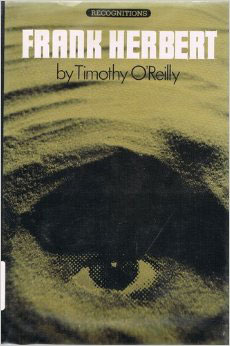Frank Herbert

How I Came to Write Frank Herbert
In the fall of 1977, when I was a couple of years out of college, I received an unexpected call from a friend, Dick Riley. He’d just landed a new job at a small publisher called Frederick Ungar, as the editor of a series of short critical monographs on detective and science-fiction writers. He was looking for authors, and as he knew I was fond of science fiction, he thought of me. Would I write a book about Frank Herbert, he wanted to know.
I struggled with his proposal, but eventually decided to give it a try. It was a momentous decision, since it was in undertaking the book that I came to think of myself as a writer. (Ironically, it was the same day that my programmer friend Peter Brajer asked me to help him rewrite his resume so he could land a job writing a manual—a job that I eventually came to help him with, and which led to our partnership not long afterwards.)
I wrote Frank Herbert over a period of about two years, and it was published in 1981. In the course of writing it, I read all of Herbert’s novels, stories, and essays, as well as a lot of his newspaper writing (which, by coincidence, included a stint at the Santa Rosa Press Democrat, the local paper for the region in which I now live.) I interviewed him several times, and, in a small way, we became friends. His ideas came to influence me deeply. I had always loved Dune and Dune Messiah, and especially the idea that predicting the future too closely can lead to a kind of paralysis. But the deeper I went, the more substance I found. Ecology, mysticism, and a kind of hard-headed insistence on the relativity of human perception and the limits of knowledge combine into a richer mix than is found in a lot of science-fiction. There’s some really cool stuff here!
My goal in writing the book was not to be a "critic", but an enthusiast. I wanted to share the additional information I’d uncovered, to present it in a way that illuminated Herbert’s work without diminishing it or "dullifying" it. In many ways, this was the same goal I embraced as a technical writer, to bring transparent assistance to the reader’s own experience, not to replace it with my own.
Like many publishing ventures, Ungar’s Recognitions series (as it was called) went largely unrecognized. Ungar itself was eventually sold to another publisher, Crossroads/Continuum, and the book went out of print, where it has remained for many years. (The last time I remember getting a royalty statement was in the late 80s.)
From time to time, I get letters from people asking if the book is still available, and I’ve always had to tell them no. (I have just two copies left myself—one hardcover, the other paperback—having given away my last "extra" just last year, to none other than Jeff Bezos, when I discovered on our trip to Washington that he was a big Frank Herbert fan!)
Last year, I wrote to Crossroads/Continuum and asked for a reversion of rights to the book so I could put it up on the Web. My letter went unanswered. Since they didn’t bother to answer, I decided to go ahead and do it anyway, figuring, as they say, that it’s sometimes easier to get forgiveness than permission. If anyone from Crossroads/Continuum notices, please give me a call or drop an email. I’d love to see the book back in print, or if not, at least to have your blessing on this Web version.
I hope those of you who are Frank Herbert fans will enjoy the book, and that those of you who are not (yet) will give his books a try. In addition, a few years later, I put together a book with Frank, a collection of his essays called The Maker of Dune, which was published by Berkely/Putnam. That too is out of print, but since most of the writing in it is Frank Herbert’s, not mine, I can’t in good conscience pull the same trick of putting it up on the Web. You may be able to find a used copy somewhere, or, if enough people care about it, perhaps the publisher could be persuaded to put it back into print. (Actually, I suppose that I could put up the interviews, which I believe I retained copyright on, but that's a project for another day.)
Next: Preface